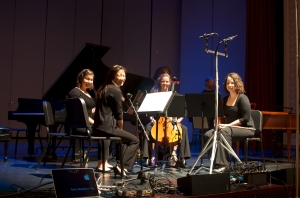Listening Guide: Show 276, Vermillion, South Dakota
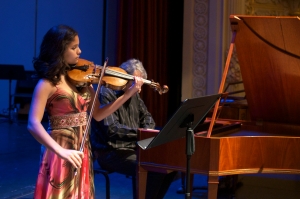 Maya Buchanan, 13 , violin
Maya Buchanan, 13 , violin
Violin Sonata No. 5 in F Major
Op. 24, “Spring”
By Ludwig van Beethoven (1770-1827)
The 1st and 4th movements are my favorites. I worked on this piece this summer while at Aspen Music Festival and playing it there reminds me a lot of Aspen’s natural setting. When I play this piece, I think of the flowing water and the shimmering Aspen trees. Beethoven is really big on dynamics, so there’s lots of subito pianos so that makes it challenging. In the opening, it is very lyrical, calm and simple and other times becomes dramatic. The dynamics are probably the hardest part – it crescendos up to a really big forte and then suddenly you have to be really soft. I love Beethoven’s music!
A favorite memory or highlight:
Having a tour of the National Music Museum in my home state with the FTT crew and fellow musicians. There were really amazing, cool, unexpected instruments inside. The Nickelodeon was my favorite. I also enjoyed spending time in he warm-up room getting acquainted with all the other musicians.
What do you believe music has the power to do?
People of all cultures and ages express themselves through music. This form of communication can be understood all over the world and inspires and positively changes the way we feel about each other. And it happens like “POW!” I don’t know of any other other “language” that affects people this way. That’s the power of music.
Evan Lee, 15, piano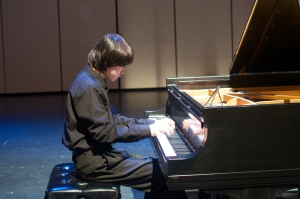
Trancendental Etude No. 4, “Mazeppa”
By Franz Liszt (1811-1886)
Any time my teacher gives me Liszt, I’m happy. I like this piece. She said, “why don’t you play this?” And I’m like, “this is cool!” There is a story behind it- I believe it’s about this prince that gets strapped to a horse and the horse is left to run free- it was because he did something, I’m not sure what it was, but the prince was being punished. He almost dies but then returns victorious and becomes king. Liszt tries to make the sound of a horse galloping throughout the piece. First, I try to focus on hitting the right stuff. Liszt is a programmatic composer, he puts titles to things and his own story. There’s no alternative story that I have in mind. This piece is always in motion so it’s hard to put together and not make it sound like a bunch of noise. It’s easy to do that considering the technique is pretty hard. The final variations are pretty large jumps, and it’s hard to get them light.
A favorite memory or highlight:
Trying all the harpsichords/old keyboard instruments at the Music Museum.
What do you believe music has the power to do?
I think music has the power to bring people together, start conversations, and make people happy.
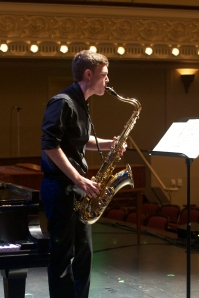 Jon Corin, 18, saxophone
Jon Corin, 18, saxophone
Fantasia for Saxophone
I. Animé
By Heitor Villa-Lobos (1887-1959)
I’ll be playing the first movement of Fantasia by Heitor Villa-Lobos. It’s a piece that I’ve been playing for a long time; something that I’ve come back to numerous times. I love the melody and the evocative contrast that occurs over the short span of this movement. When I first put this piece together with piano, it gained a whole new meaning for me. It came to life right before my eyes, like an old friend who just revealed something brand new about himself (thankfully it was something good). Since then, every time I play the piece I try to take something new from it, hopefully giving something new to the listener.
A favorite memory or highlight:
Playing the gamelan with the whole group of kids. Finally hearing everyone play.
What do you believe music has the power to do?
I believe it can bring people together, forming amazing relationships. Music can empower people to help others.
Henry Johnston, 16, guitar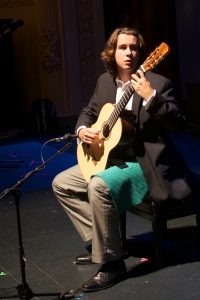
Sonata No. 3
III. Allegro non troppo
By Manuel Ponce (1882-1948)
I’m playing the Ponce piece on the show. I’ve been playing it for a pretty long time. I learned the second movement first about three years ago, my dad suggested the piece for me and I took to it immediately. I learned the third movement about two years ago. I’m working on the first movement now. I really like the movement I’m playing. In the context of the piece, it seems like a pretty triumphant movement. It’s got a recurring theme, a real big strummed chord. Sometimes you expect it and sometimes you don’t, so it manages to keep an audience guessing. It’s got a beautiful middle section full of moving chords, which is fun as a guitar player to get to play because it really forces you to make decisions about the voicing of the chords, which notes you want at the forefront and which ones you want to lay back a little bit more. Pianists spend all sorts of time thinking about that, emphasis within a chord, but with a lot of guitar players it goes unnoticed.
A favorite memory or highlight:
Visiting the National Music Museum, the setting of the show really enriched the whole experience for me and created some great new connections within the music world.
What do you believe music has the power to do?
It’s got the power to bring people together and expose you to new things.
Anna Humphrey, 17, violin I
A favorite memory or highlight:
The actual performance was a lot of fun. Where the dress rehearsal seemed stressful and serious, the performance was light hearted and exciting.
What do you believe music has the power to do?
I believe music has the power to promote peace around the world. It brings people together as a universal language.
Emma Richman, 15, violin II
A favorite memory or highlight:
Spending time with the other musicians and getting to know them better was one of my favorite parts. We got along extremely well and I feel like I’ve known them for much longer than three days. It was also amazing to meet more talented musicians from all over the country.
What do you believe music has the power to do?
Music has the power to bring people together. People from all different backgrounds can get along simply because they all speak the same language of music.
Alexandra Sophocleus, 18, viola
A favorite memory or highlight:
Getting to know the other musicians on our episode was a huge highlight. It is always so awesome to meet other people our age with our interests from other parts of the country.
What do you believe music has the power to do?
Music has the power to help people express what words cannot. It gives people something to relate to and helps people make connections to others. My strongest friendships are the ones based around musical experiences.
Nora Doyle, 17, cello
A favorite memory or highlight:
Playing the gamelan! Seeing the museum and the experimental instruments. Also the pizza party and meeting everyone.
What do you believe music has the power to do?
Music can give people confidence and a sense of self-worth, connect people from different cultures.

